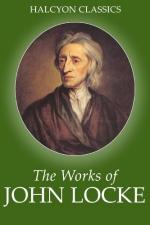
|
| Name: _________________________ | Period: ___________________ |
This test consists of 15 multiple choice questions and 5 short answer questions.
Multiple Choice Questions
1. Who in the First Treatise does not have subjects to govern?
(a) Patriacha.
(b) God.
(c) Adam.
(d) King James.
2. What fact does Locke believe refutes Filmer's claims?
(a) The slave owner's rights.
(b) The birth of Adam.
(c) The property owner's rights.
(d) The sovereignty shared between parents.
3. What does Filmer call the relationship between a man and his parents?
(a) The vested power.
(b) Royal or fatherly authority.
(c) Painful subjugation.
(d) The inheritance of kings.
4. What was Cain told about his power?
(a) That he will lose it.
(b) That he will rule over his brother Abel.
(c) That it will diminish with age.
(d) That he has none.
5. What does Locke think sometimes determines who will be king?
(a) Wealth.
(b) The size of the army and its success.
(c) Luck.
(d) A person's intelligence.
6. Who does Filmer think is an ideal monarch?
(a) Eternally youthful.
(b) Ineffectual.
(c) An absolute ruler.
(d) A despot.
7. What two things does Filmore say are necessary for absolute monarchy to work?
(a) That the kings fight to maintain control and never concede defeat.
(b) That the people remain ignorant and powerless.
(c) That the power does not die with Adam, and that it continues through generations.
(d) That the citizens accept it, and that some people are slaves.
8. What does Filmer believe about the relationship between men and parents?
(a) That it is irrelevant.
(b) That men are subjugated to the will of their parents.
(c) That is the source of all conflict in society.
(d) That it is contentious.
9. What two powers are considered identical by Filmer?
(a) The right to own property and the right to marry someone of your own choice.
(b) The right to own a slave and the right to fight.
(c) The power of the fathers and the power of kings.
(d) The power of marriage and the power of childbirth.
10. What biblical book connects monarchy with the commandment to honor thy father?
(a) Revelation.
(b) Genesis.
(c) Exodus.
(d) Proverbs.
11. What was dominion measured in during this time?
(a) Property.
(b) Size of kingdom.
(c) The amount of goods that the first-born would inherit.
(d) Slaves.
12. Who offers a compelling argument in favor of the right to rule?
(a) Locke.
(b) Adam.
(c) Filmer.
(d) Eve.
13. How does Filmer define the relationship between man and other creatures?
(a) Man fights with other creatures.
(b) Man and other creatures are equal.
(c) Man is subservient to other creatures.
(d) Man has the right to use creatures.
14. What does Locke contest about Cain's rights?
(a) Locke does not believe that Cain has dominion over Abel because he is older.
(b) Locke contests that Cain is physically stronger than his brother.
(c) Locke believes that Cain's rights are limited because he is not as intelligent as his brother.
(d) Locke feels that Cain's rights are impermanent.
15. What does the basis of government depend upon according to Locke?
(a) The prevention of cruelty.
(b) The need for order.
(c) The sanctity of marriage.
(d) The origin of property.
Short Answer Questions
1. What does Sir Robert conclude about the use of the term "children of men"?
2. What quality does Filmer determine that all rulers must possess?
3. Which son of Adam is the oldest?
4. In the First Treatise, whose heir is in question?
5. Why it is important to figure out the right of inheritance?
|
This section contains 586 words (approx. 2 pages at 300 words per page) |

|




